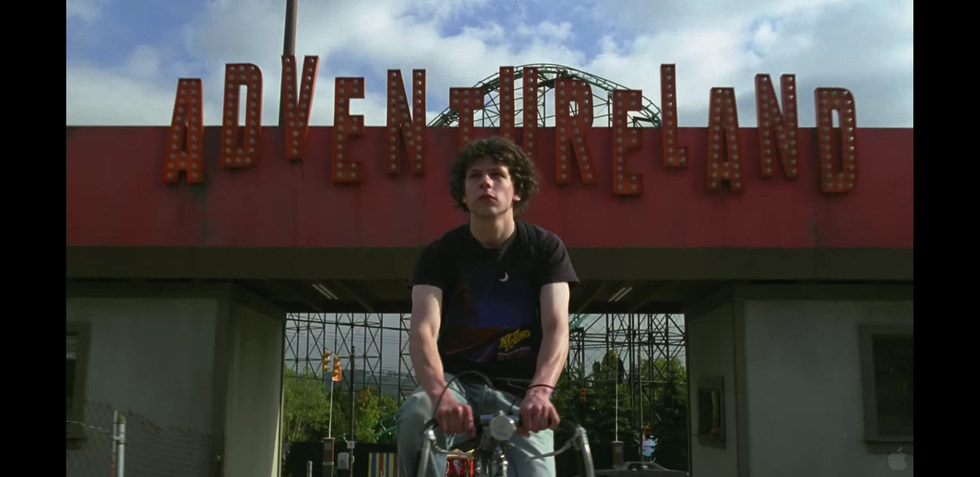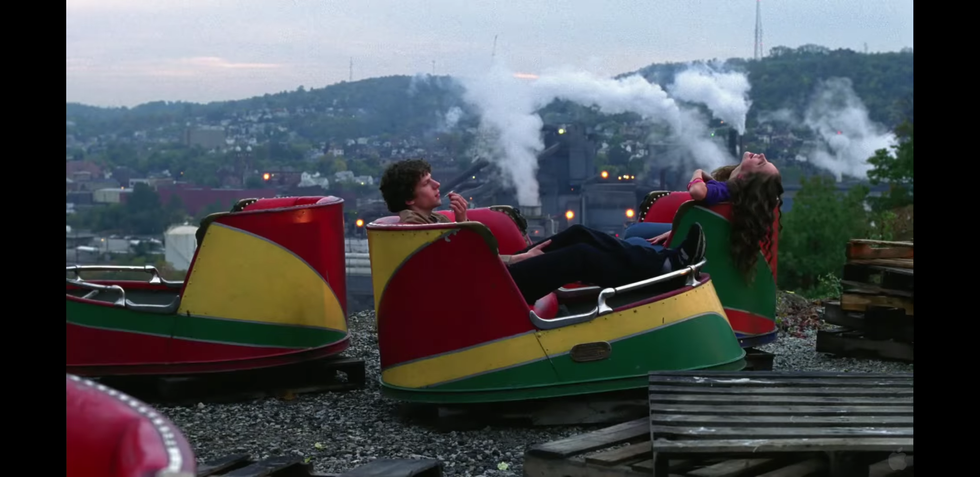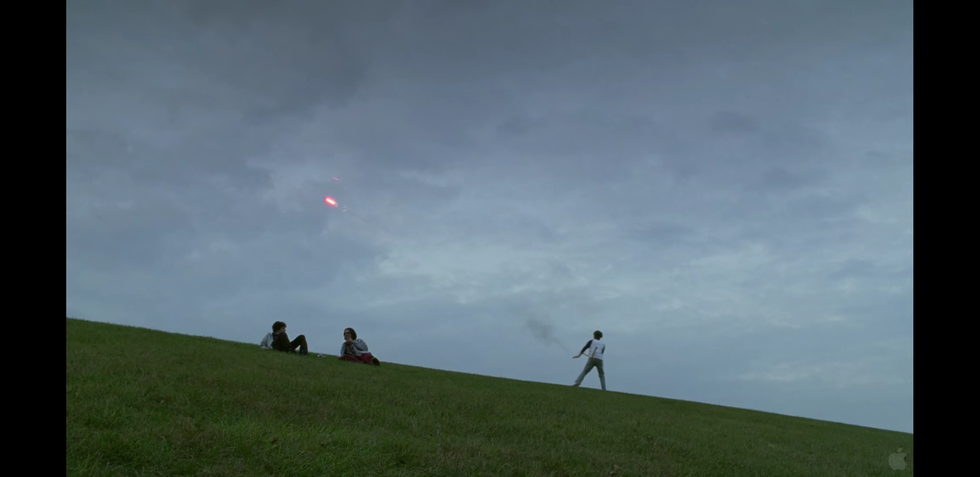As the familiar New York skyline in the Miramax graphic displays, the hard opening riff to "Bastards Of Young" by The Replacements blares, kicking off the movie both narratively and thematically. The chorus "We are the sons of no one/Bastards of young" could be the anthem of the main characters, trapped and too old to be accounted for, but too young to have anything of their own. In the music and the attitude and the socioeconomic statuses of the characters (as well as the real economic state that they were in), we see something rare in period peaces: a body of characters that do not just endure through the environment, but also thrive in spite of it. Greg Mottola's 2009 "Adventureland" is an underrated masterpieces that gleefully navigates through love, music, and finding bliss in a generation rigged against the system.
As "Bastards Of Young" plays, the title card "1987" pops up, introducing the audience (surely mostly consisting of Millennials) to the times in which this story takes place. It's important to set the scene of 1987 because, as said before, the endurance and thriving of the characters is steeped in the circumstances of the time. America was steeped in the second Reagan term, and Reaganomics was facing its disastrous downfall. Partly because of this, much of the younger generation, Generation X, had created their own counterculture. They were tired of the capitalistic climb to the top and decided to revel, becoming bastard children of the system. Only four years after 'Adventureland' took place did 'Slacker' come out, a seminal examination on the slacker culture that flourished in the 90s but only started in the 80s. So, to document the start of this counterculture in the depths of a dead-end Pittsburgh amusement park could not have been a better decision.
James Brennan (Jesse Eisenberg), a recent college grad, is slated to go to Europe for a graduation present with his best friend, Eric (Michael Zegen) but, at his graduation party, his parents tell him that his father had been demoted to a lower position at work making "considerably less". Because of this, they would not have enough money to pay for his trip. Even more so, they would not be able to pay for James' tuition at Columbia for graduate school, and he would have to work a summer job to pay for it. James' father (Jack Gilpin) is the representation of the well-off worker screwed by Reaganomics, and the effect has, for lack of a better term, trickled down to his son. James does not have much luck, either; due to a lack of previous work experience, he failed getting even an interview in the rough job market. "I majored in Comparative Literature and Renaissance Studies," James says. "Unless someone needs help restoring a fresco, I'm screwed."
With no other options, James resorts to working as a carnie at the neighborhood theme park, Adventureland. There, James quickly discovers the capitalistic tendencies of the park itself. Several games are rigged for people to lose, including a basketball game with a rim hammered into an ovular shape. "It barely fits," James says. "That's so wrong." "A criminal abuse of the laws of physics," carnie vet and Slavic scholar Joel (Martin Starr) says. James is placed at games, being that the park uniforms are divided by the retro blue "games" shirt and the retro red "rides" shirt. After requesting a rides position, park co-owner Bobby (Bill Hader) quickly dismisses James' request, saying "you look more like a games guy."
Isolated to his section, James quickly befriends Em (Kristen Stewart), one of the most prevalent "slacker" of the bunch. She comes from a well-off family, but she electively decided to work at Adventureland. People like James, Joel, or Lisa P. (Margarita Leviava) were forced into the position, but Em is there, seemingly, in rebellion against her family. This family, one can argue, is the "perfect American family" that has been so often idolized and deconstructed in American culture. It looks perfect on the surface, but it's breaking on the seams.
And all these people, working at the same place, need to cope with the monotony and listlessness of the job. The misgivings of the owners are now put on to the workers as responsibility, like when James is almost put at knife point for not giving a customer a "giant-ass panda." They are also subject to the trash pop music that was popular at the time (a specific example being "Rock Me Amadeus" by Falco). They are also given tasks that certainly do not require or reward their formal education. After winning an arcade game, Joel says "'Audentis Fortuna Iuvat. Fortune favors the bold;' Virgil said that." "I'm sure Virgil had 'Bionic Commando' in mind," Em says. Then, there's a scene where Bobby and Paulette (Kristen Wiig) encourage James to be more fun when he's at the horse racing station. James gives hilarious commentating, including lines like "put down your mint juleps", "green runs well on a muddy track", and "come to the window to collect your winnings", but this is only met with a confused look on the faces of Bobby and Paulette.
The only real enjoyment James receives in his job is with his coworkers, specifically Em, and they steadily start a romantic relationship. It's a relationship devoid of the prototypical romantic advances but instead of the nihilism and pragmatism appropriate for the times. Their first "date" is at a dead-end bar, and, although James does give her a mixtape, it is not of sappy love songs but, instead, James' "bummer playlist." But it's with this in mind that they see the virtue in each other. Maybe they could only make out in the parking lot, but they do it anyway because there is no alternative.
And what may separate the ideologies of these characters in "Adventureland" from those in "Slacker" is that these people have an end-goal in mind (Joel excluded.) Both James and Em work at Adventureland that summer in hopes of living in New York, leaving the park and everything that comes with it past them. They understand that they can be utilized better elsewhere, and they know that those places can give them more agency. They are given more agency, and they are given more privileges. When Eric comes back from his summer in Europe, he states that very clearly: "fuck the old world; I want the new world."
While this is certainly an ideal, it is, unfortunately, just not an option for many people — at least at first. Just a single car crash can determine between going to Columbia and sleeping at the neighborhood Y, while selling guns to Iran comes with no consequences. Nothing is guaranteed (even if it should be expected), and that's why these characters are so admirable. Even with no options, they find a way to experience bliss, bliss in a generation rigged against the system.





















